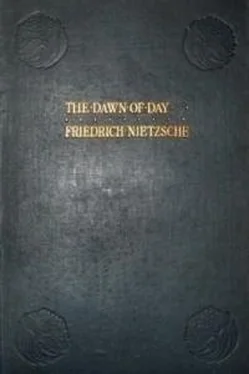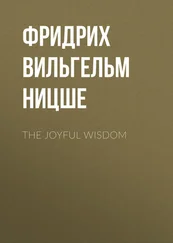438.
MAN AND THINGS.—Why does the man not see the things? He himself is in the way: he conceals the things.
439.
CHARACTERISTICS OF HAPPINESS.—There are two things common to all sensations of happiness: a profusion of feelings, accompanied by animal spirits, so that, like the fishes, we feel ourselves to be in our element and play about in it. Good Christians will understand what Christian exuberance means.
440.
NEVER RENOUNCE.—Renouncing the world without knowing it, like a nun, results in a fruitless and perhaps melancholy solitude. This has nothing in common with the solitude of the vita contemplativa of the thinker: when he chooses this form of solitude he wishes to renounce nothing; but he would on the contrary regard it as a renunciation, a melancholy destruction of his own self, if he were obliged to continue in the vita practica . He forgoes this latter because he knows it, because he knows himself. So he jumps into his water, and thus gains his cheerfulness.
441.
WHY THE NEAREST THINGS BECOME EVER MORE DISTANT FOR US.—The more we give up our minds to all that has been and will be, the paler will become that which actually is. When we live with the dead and participate in their death, what are our “neighbours” to us? We grow lonelier simply because the entire flood of humanity is surging round about us. The fire that burns within us, and glows for all that is human, is continually increasing—and hence we look upon everything that surrounds us as if it had become more indifferent, more shadowy,—but our cold glance is offensive.
442.
THE RULE.—“The rule always appears to me to be more interesting than the exception”—whoever thinks thus has made considerable progress in knowledge, and is one of the initiated.
443.
ON EDUCATION.—I have gradually come to see daylight in regard to the most general defect in our methods of education and training: nobody learns, nobody teaches, nobody wishes, to endure solitude.
444.
SURPRISE AT RESISTANCE.—Because we have reached the point of being able to see through a thing we believe that henceforth it can offer us no further resistance—and then we are surprised to find that we can see through it and yet cannot penetrate through it. This is the same kind of foolishness and surprise as that of the fly on a pane of glass.
445.
WHERE THE NOBLEST ARE MISTAKEN.—We give some one at length our dearest and most valued possession, and then love has nothing more to give: but the recipient of the gift will certainly not consider it as his dearest possession, and will consequently be wanting in that full and complete gratitude which we expect from him.
446.
HIERARCHY.—First and foremost, there are the superficial thinkers, and secondly the profound thinkers—such as dive into the depths of a thing,—thirdly, the thorough thinkers, who get to the bottom of a thing—which is of much greater importance than merely diving into its depths,—and, finally, those who leap head foremost into the marsh: though this must not be looked upon as indicating either depth or thoroughness! these are the lovers of obscurity. [13] The play upon the words gründlich (thorough) thinkers, and Untergründlichen (lit. those underground) cannot be rendered in English.—TR.
447.
MASTER AND PUPIL.—By cautioning his pupils against himself the teacher shows his humanity.
448.
HONOURING REALITY.—How can we look at this exulting multitude without tears and acquiescence? at one time we thought little of the object of their exultation, and we should still think so if we ourselves had not come through a similar experience. And what may these experiences lead us to! what are our opinions! In order that we may not lose ourselves and our reason we must fly from experiences. It was thus that Plato fled from actuality, and wished to contemplate things only in their pale mental concepts: he was full of sensitiveness, and knew how easily the waves of this sensitiveness would drown his reason.—Must the sage therefore say, “I will honour reality, but I will at the same time turn my back to it because I know and dread it?” Ought he to behave as certain African tribes do in the presence of their sovereign, whom they approach backwards, thus showing their reverence at the same time as their dread?
449.
WHERE ARE THE POOR IN SPIRIT?—Oh, how greatly it goes against my grain to impose my own thoughts upon others! How I rejoice over every mood and secret change within me as the result of which the thoughts of others are victorious over my own! but from time to time I enjoy an even greater satisfaction, when I am allowed to give away my intellectual possessions, like the confessor sitting in his box and anxiously awaiting the arrival of some distressed person who stands in need of consolation, and will be only too glad to relate the full misery of his thoughts so that the listener’s hand and heart will once again be filled, and the troubled soul eased! Not only has the confessor no desire for renown: he would fain shun gratitude as well, for it is obtrusive, and does not stand in awe of solitude or silence.
But to live without a name, and even to be slightly sneered at; too obscure to arouse envy or enmity; with a head free from fever, a handful of knowledge, and a pocketful of experience; a physician, as it were, of the poor in spirit, helping this one or that one whose head is troubled with opinions, without the latter perceiving who has actually helped him! without any desire to appear to be in the right in the presence of his patient, or to carry off a victory. To speak to him in such a way that, after a short and almost imperceptible hint or objection, the listener may find out for himself what is right and proudly walk away! To be like an obscure and unknown inn which turns no one away who is in need, but which is afterwards forgotten and laughed at! To be without any advantages over others—neither possessing better food nor purer air, nor a more cheerful mind—but always to be giving away, returning, communicating, and becoming poorer! To know how to be humble in order to be accessible to many people and humiliating to none! To take a great deal of injustice on his shoulders and creep through the cracks and crannies of all kinds of errors, in order that we may reach many obscure souls on their secret paths! ever in possession of some kind of love, and some kind of egoism and self–enjoyment! in possession of power, and yet at the same time hidden and resigned! constantly basking in the sunshine and sweetness of grace, and yet knowing that quite near to us stands the ladder leading to the sublime!—that would be life! that would indeed be a reason for a long life!
450.
THE TEMPTATIONS OF KNOWLEDGE.—A glance through the gate of science acts upon passionate spirits as the charm of charms: they will probably become dreamers, or in the most favourable cases poets, so great is their desire for the happiness of the man who can discern. Does it not enter into all your senses, this note of sweet temptation by which science has announced its joyful message in a thousand ways, and in the thousand and first way, the noblest of all, “Begone, illusion! for then ‘Woe is me’ also vanished, and with it woe itself is gone” (Marcus Aurelius).
451.
FOR WHOM A COURT JESTER IS NEEDFUL.—Those who are very beautiful, very good, and very powerful scarcely ever learn the full and naked truth about anything,—for in their presence we involuntarily lie a little, because we feel their influence, and in view of this influence convey a truth in the form of an adaptation (by falsifying the shades and degrees of facts, by omitting or adding details, and withholding that which is insusceptible of adaptation). If, however, in spite of all this, people of this description insist upon hearing the truth, they must keep a court jester—a being with the madman’s privilege of being unable to adapt himself.
Читать дальше











